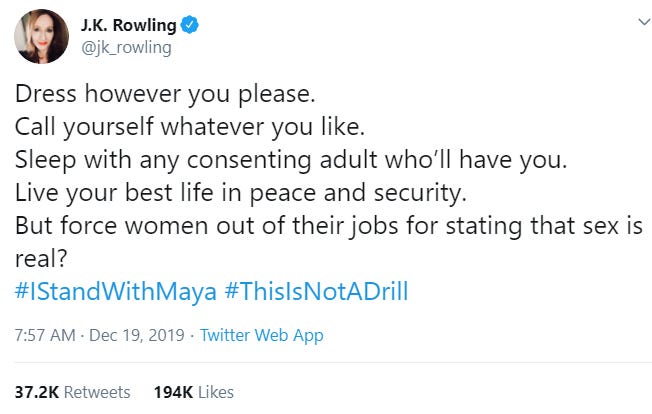
Here's A British Employment-Law Expert's Take On The Maya Forstater Controversy
My email and his response

None of this will make sense if you’re not familiar with the Maya Forstater/J.K. Rowling controversy, which you can either read about here — that’s a long and comprehensive (I think!) post for paid subscribers only — or Google.
In trying to puzzle out what my stance on it should be, I sent an email to Darren Newman, the author of an extremely helpful blog post laying out the employment tribunal ruling that sits at the center of all of this. I found his response, like his post, to be very illuminating. (He’s on Twitter, too, if you’d like to follow him.) If the below helps you understand this issue, please consider becoming a paid susbcriber to my newsletter — it’s only because of my paid subscribers that I’m able to take the time to report on an issue as complicated as this one and then produce a lengthy, in-depth post about it from an informed perspective.
My Email To Darren Newman
Hi Darren,
I'm a U.S.-based journalist who has written a bit about trans issues, I found your post on the Forstater case extremely helpful. I'm writing a post for my readers trying to explain what did and didn't happen here, because, as you say, there's a lot of misinformation online.
My post already leans heavily on (and links to) your work, but is there any chance you could send me quick responses to these two outstanding questions I have by, say, noon your time tomorrow? Totally understand if that's not reasonable, especially in light of the holidays. I'll of course link to your website either way.
1. One part that confuses me is the judge's focus on Forstater's online behavior toward two nonbinary/genderfluid people who don't have GRAs. How is that relevant here to determining her beliefs as pertaining to people who DO have GRAs? Because the judge's ruling doesn't, or shouldn't have, anything to do with Forstater's beliefs about the mutability of biological sex *in non-GRA instances*, right? So I'm confused as to why the judge views it relevant. It might be that Gregor Murray is offended at being called a man, and I certainly wouldn't misgender them, but if all this stuff hinges on the GRA and the EqA, and neither of those have anything to say about Murray (or, for that matter, the genderfluid individual who didn't legally transition), how is any of that relevant?
2. The Forstater case isn't particularly 'clean' because of those online spats and because Forstater explicitly denies that someone's sex has (at least legally) changed after obtaining a GRC. Let's imagine someone instead posts this, and only this: "I think trans people deserve to live with respect and dignity, and out of politeness I will use their preferred pronouns, but I disagree with the idea, enshrined in UK law, that once someone has a GRC their sex is suddenly 'really' whatever it says on that document. I think if you are born male, you fundamentally remain a man, and vice versa -- I'm using those terms in their traditional senses, as they currently look in some dictionary entries." Their coworker then complains about this. I see nothing in the ruling that would protect this person, even though they haven't engaged in some of the more personal, rude attacks Forstater did. Am I missing something here?
Thanks again, and like I said no worries at all if you don't have time for this at the moment.
-Jesse
Newman’s Response
Hi Jesse
Thanks for getting in touch. I’ve been rather taken aback by the amount of attention my blogpost received. I usually write for a very specialist and nerdy client base of HR practitioners and employment lawyers. Obviously this subject is one that arouses serious passions on both sides.
I should emphasise first of all that this is just a Tribunal decision. Tribunals do not have the status of any superior court and their decisions are not binding precedents. Judgments are not always drafted carefully and precisely – in fact most of them are given orally and never recorded in detail. I think there is a danger that this particular decision is being subjected to a level of scrutiny that it cannot reasonably bear.
An appeal will almost certainly be made to the next level up – the Employment Appeal Tribunal. This has the same status as a High Court decision and it is the first level at which employment lawyers start to pay attention to what is actually being said. When it examines the Tribunal decision it will remind itself that it should not take an overly technical view of what the Tribunal has said. The Tribunal may make mistakes but essentially be forgiven by the EAT if, overall, it has reached a decision it is entitled to reach.
The best criticism I have seen of the Tribunal’s reasoning is that it has jumbled together the belief itself from the behaviour that may be prompted by the belief. The Tribunal acknowledges this problem and actually suggested that it should not make a preliminary ruling at all but decide all of the issues at a final hearing. However the claimant insisted on having the issue of belief decided first so may struggle to criticise the Tribunal too much if the result is unsatisfactory.
When it comes to the Murray issue the Tribunal seems to have found that it is an essential part of the Claimant’s belief that she should be free to express her views irrespective of the feelings of others. If that happened in a work context it could amount to harassment relating to gender reassignment, which is outlawed under the Equality Act. I’d regard this as an additional ground for the Tribunal finding that her belief was not protected, but it does seem to cross the line between belief and behaviour. I think that even if the EAT said the Tribunal was wrong to reason in this way, it could still uphold the decision based on the reasoning around the acceptance of the gender recognition certificate.
As for the ‘clean example’ you give – I just don’t know. Ironically the more reasonable you make the belief the more likely it is to be just an opinion based on facts and evidence rather than a philosophical belief. The fact that Forstater’s view was so fixed and that she was unwilling to consider any evidence to the contrary actually helped her case. In Great Britain we don’t protect political or other opinions in the workplace. It is worth remembering that the protected characteristic that Forstater is relying on is ‘religion and belief’ which gives you an idea of the flavour of the protection. There are many perfectly sensible beliefs and opinions that won’t come under this category and which will therefore not give rise to a discrimination claim if someone is treated less favourably because of them.
My biggest gripe about the commentary this case has generated is the suggestion that it gives employers the right to dismiss someone for expressing Forstater’s beliefs. It does not. This was not a case of unfair dismissal – which is the usual claim when an employee is dismissed in circumstances that they consider to be unreasonable. An employer who dismissed an employee for expressing the view you identify would struggle to show that that was within ‘the range of reasonable responses’. But of course it is unlikely to be tested – because when has anyone ever been dismissed for holding that particular view?
There is a big difference between holding that a belief or opinion is not protected by the Equality Act and holding that an employer is entitled to dismiss anyone who holds that belief.
I hope this helps a bit. I don’t plan to comment on the case any further because – as I keep reminding people – it is just a Tribunal decision. By paying it too much attention we actually magnify its impact or chilling effect. We should just wait and see if there is an appeal, at which stage we can start looking at the reasoning more carefully. I’d expect that to take about a year, so we may be discussing this again towards the end of 2020!
Happy Holidays
Darren








